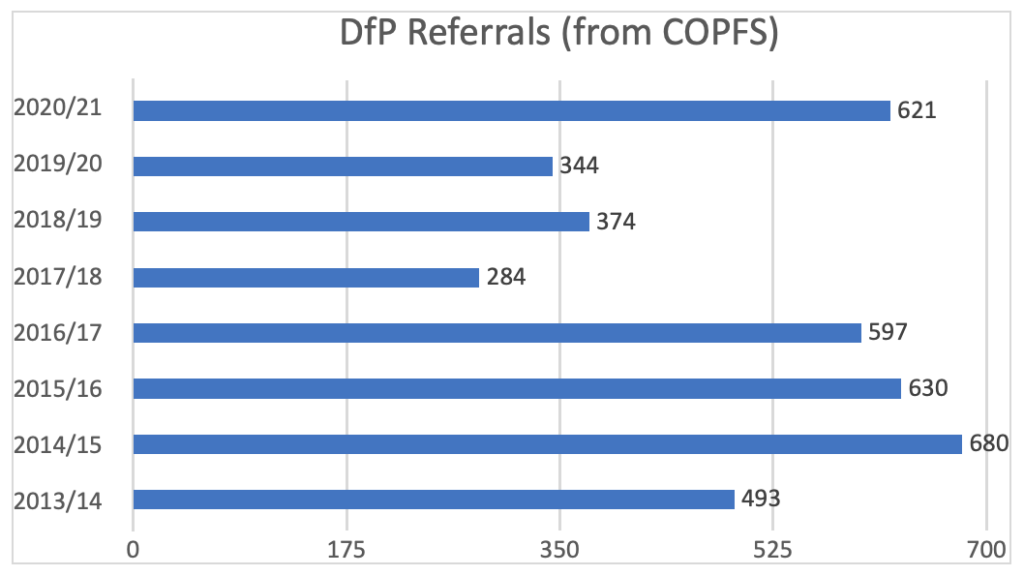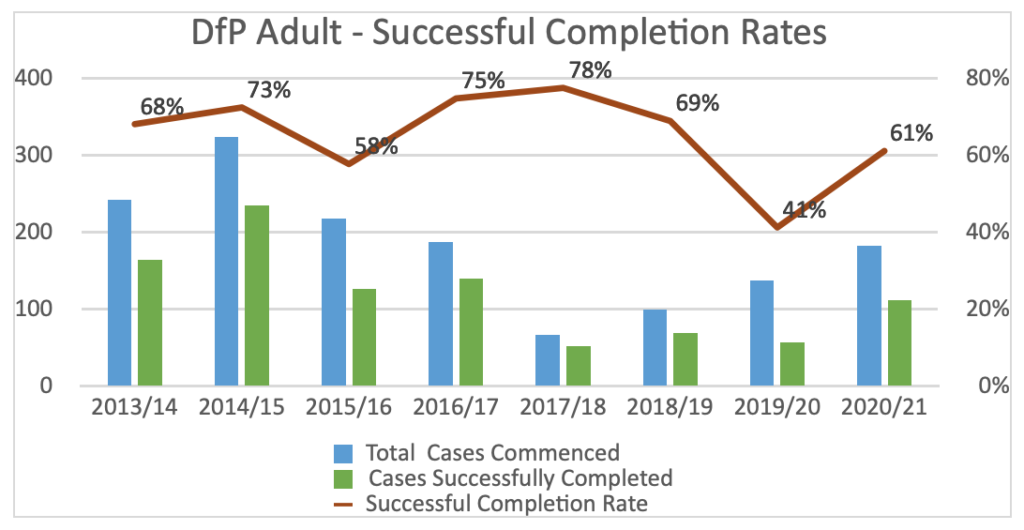Team Leader, Criminal Justice Social Work, Fast Track Team
Diversion from Prosecution is a process by which the Crown Office and Prosecutor Fiscal Service (COPFS) can refer a case to Social Work Services and their partners.
Cases are generally referred to Diversion from Prosecution when the individual who has been referred to COPFS has an identifiable need, and the diversion would be the most appropriate outcome for that individual as well as being in the public interest.
Currently Police Scotland submit a Standard Prosecution Report to the COPFS and based on information contained in the Report, the Procurator Fiscal will decide on whether or not to consider Diversion from Prosecution
However arresting officers may not always be aware of the various issues surrounding the individual being arrested and as a result may not be aware of their suitability for Diversion
In an article in the 2020-21 Annual Reporter ‘Partnering for Benefits to Wider System – Improving DfP Information Flow’, my colleague Lynsey Smith, Head of Justice Services for Glasgow’s Health & Social Care Partnership, discussed an Improvement Plan for DfP Adult with an ambition to increase the referral numbers and successful completion rates. The Improvement Plan formed one of 3 priority areas of work agreed by Stakeholders across the Community Justice Glasgow Partnership for reducing re-offending.
Work in relation to that Improvement Plan is starting to show results – with much of the initial work having been centred around improving understanding and confidence in the robust Diversion services and programmes available for a variety of offence types. Chart 1 below, shows an 80.5% increase in referrals between 2019/20 and 2020/21 – figures for 2021/22 were not yet published at time of writing. It will be interesting to see if this improvement continues into a trend in the coming years. It should be acknowledged that a proportion of the increase in 2020/21 could be attributed to a backlog created by the Covid19 Pandemic restrictions across all of justice. The Test of Change will be evaluated over Sep/Oct & Nov 2022 – WATCH THIS SPACE

Evidence tells us that having the right services that meet individual’s needs at the right time has an impact on the risk of re-offending, Chart 2 below shows a 20 point increase in the percentage of successful completions between 2019/20 and 2020/21, suggesting that we are on the right trajectory and that the improvement work is showing good results.

Over 2021-22, the focus shifted to the established of a Test of Change Project to improve the sharing and flow of information between Police Scotland, Glasgow Criminal Justice Social Work and COPFS to allow for more informed decisions to be made on an individual’s suitability for Diversion.
Information provided by Police Scotland will include insights such as if the offender has issues around Mental Health, addictions or alcohol misuse. It could also include information around the individual’s vulnerability disabilities family dynamics and education training and employment.
Once collated this information will be incorporated in the Standard Prosecution Report (SPR) which is then sent to the Procurator Fiscal. Once the Fiscal has this report it will be easier to decide on the appropriateness of Diversion and will also make the process more streamlined to cut down on delays from when an individual is charged and arrested to when the matter is delt with.
I am pleased to tell you that that Test of Change, is now operational. A dedicated Criminal Justice Social Care Worker has been assigned to the work (housed within the Diversion from Prosecution Team) to enhance the quality of Standard Police Reports and compliment the information already provided by the Police in these. This resource – funded by Glasgow Health & Social Care Partnership – will access systems, signpost to services and arrange access to services for the accused person to meet the needs and underlying drivers of the offending behaviour – with the information on engagement etc. being included in the SPR. It is envisaged that this will save the public purse from any unnecessary prosecutions, protect the public and ultimately reduce reoffending
Aims of Diversion from Prosecution – The aim of Diversion from Prosecution is to provide a disposal which, due to the circumstances of the individual and the circumstances of the alleged offence, provides an appropriate person-centred response. It also allows a swift intervention which can interrupt a cycle of offending and prevent further involvement in offending behaviour.
People rather than cases are diverted and as with other non-court disposals diversion is not restricted to an exhaustive list of offences but would generally be suitable in respect of minor offending which does not present a risk of serious violence or danger to the community.
The short video below about prevention and diversion is one of 7 in a showcase of videos made by people with lived experience of being in the justice system (commissioned by Community Justice Glasgow). The films will be used to ignite discussions amongst influencers, decision makers and communities across Glasgow about Community Justice, for this one in particular, those discussion will be around the need to put resources further up-stream – to prevent escalation into more serious offending and the more costly (in terms of outcomes for people and communities and the public purse) end of the justice system. Focussing on why people are falling in the river, rather than fishing them out downstream so to speak.
The Diversion Process – Where the Procurator Fiscal defers prosecution to allow Social Work intervention the case will be allocated to Diversion Team. The offender is then contacted, and an assessment is carried out with regards to suitability and willingness to engage with the process. The report is then sent to the Fiscal and the offender becomes subject to a 3-month period of Diversion where they will be given opportunities to address their offending behaviour and access support for those problems which contributed to the offending.
In many cases this will involve the provision of general advice and guidance. This could relate to a variety of areas including accommodation, benefits and employability. In other cases, the Diversion worker will act as a referral point to other specialist services. These services may include:
- 218 Women’s Project
- Apex Scotland
- Community Addictions Services and Recovery Hubs (various)
- Local Mental Health Services (various)
- Services for women involved in prostitution (various)
- Youth Justice Services
All of the work undertaken on Diversion should be planned and completed within three months although Social Work intervention may continue beyond this period.
On completion a final report is sent to the Procurator Fiscal and if the offender has successfully engaged in the process a recommendation will be made that no further action is required on the presenting case. However, the final decision remains with the Fiscal.
Diversion from prosecution offers the offender an opportunity to engage at an early stage with criminal justice services to address issues around offending and underlying problems. Successful completion of a diversion can prevents that individual from acquiring a criminal record and hopefully prevent any further involvement in the Criminal Justice System.





